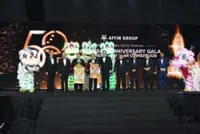An organisation of mostly illiterate men offers lessons in efficiency to Fortune 500 companies and Ivy league management programme students.
EVER since the tiffin men of Mumbai, India, appeared in an episode of Planet Food on Discovery Travel & Living (now the Travel & Living Channel), I have been curious about them. Daily, on the streets of Mumbai, 5,000 men known as dabbawalas routinely deliver home cooked lunches in tiffin carriers to 200,000 working people all over the city!





